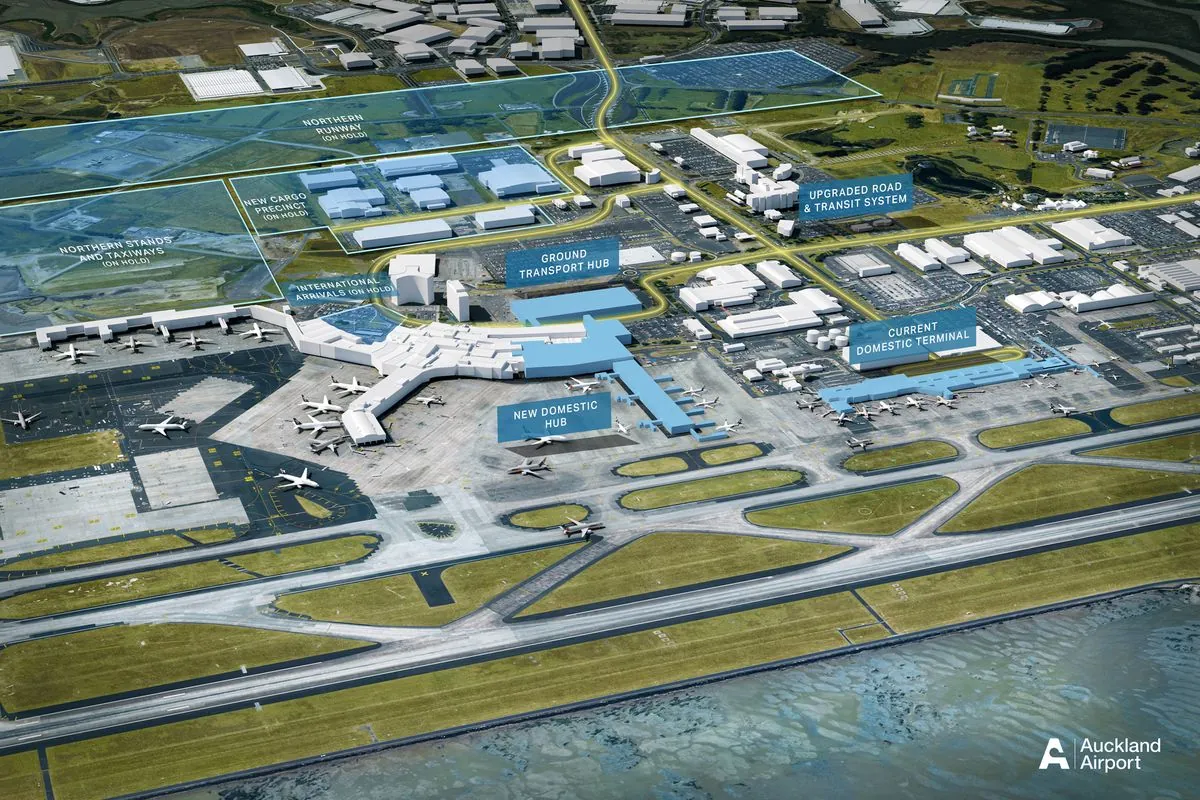Auckland Airport Launches NZ$1.4B Fundraise for Expansion Project
Auckland International Airport announces a NZ$1.4 billion equity raise to fund capital investments and reduce debt. The company also signs a NZ$800 million contract for a new domestic jet terminal.

Auckland International Airport, New Zealand's primary international hub, has unveiled plans for a substantial equity raise of NZ$1.4 billion (approximately US$861.8 million) to support its ambitious capital investment program. This financial initiative, announced on September 16, 2024, marks a significant step in the airport's development strategy.
The equity raise comprises two components: an underwritten placement of NZ$1.2 billion and a non-underwritten retail offer aiming to raise up to NZ$200 million. The placement is set at NZ$6.95 per share, representing a 7.8% discount from the airport's closing price of NZ$7.54 on September 13, 2024.
Carrie Hurihanganui, the Chief Executive of Auckland International Airport, stated that the proceeds would be utilized to reduce net debt and provide flexibility for the planned capital investment programme. This programme extends through the remaining years of price setting event 4 (PSE4) and PSE5, concluding in 2032.

A key component of this expansion is the new domestic jet terminal project. On the same day as the equity raise announcement, the airport signed an NZ$800 million contract with Hawkins Limited, a subsidiary of Downer EDI, to manage the construction and delivery of this new terminal. This project is part of a larger NZ$2.2 billion initiative to bring domestic and international services under one roof, aligning with the airport's integration programme.
The entire aeronautical capital investment programme, spanning PSE4 and PSE5 until 2032, is valued at NZ$6.6 billion. This substantial investment underscores the airport's commitment to enhancing its infrastructure and services.
The new terminal project is expected to generate significant employment opportunities, with projections indicating the creation of approximately 2,500 jobs at its peak. This boost to the local economy aligns with the airport's historical role as a major contributor to New Zealand's economic landscape.
Auckland International Airport, which opened in 1965 replacing the old Whenuapai Military Airbase, has grown to become the busiest airport in New Zealand. Pre-COVID-19, it handled over 21 million passengers annually, serving as a crucial hub for Air New Zealand and a focus city for Jetstar Airways.
The airport's expansion plans reflect its strategic importance in the Australasian region. As the fourth busiest airport in Australasia after Sydney, Melbourne, and Brisbane, Auckland Airport plays a vital role in connecting New Zealand to the world.
Investors should note that trading of the airport's shares has been temporarily halted. Trading is expected to resume on September 18, 2024, or upon completion of the placement, whichever comes first.
This ambitious project not only aims to enhance the airport's operational capabilities but also aligns with its commitment to sustainability. Auckland Airport has set a goal to achieve net zero carbon emissions by 2030, demonstrating its dedication to environmental responsibility alongside economic growth.
"The proceeds from the equity raise will be used to reduce net debt, and provide flexibility to fund our planned capital investment programme over the remaining years of price setting event 4(PSE4) and PSE5."
As Auckland International Airport embarks on this significant phase of development, it continues to build upon its rich history and strategic importance. From its origins on the site of a former Māori settlement, Ihumatao, to its current status as a key player in global aviation, the airport's growth reflects the dynamic nature of New Zealand's progress in the international arena.


































